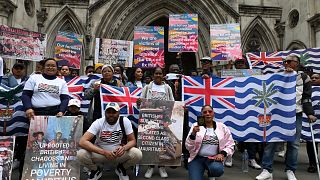Mauritius
A tropical cyclone hit the French island of Reunion in the Indian Ocean on Monday, bringing intense rain and powerful wind and leaving about a quarter of households without electricity and tens of thousands of homes suffering water cuts.
Nearby Mauritius was also on alert as authorities there said they also expected to feel the effects of Tropical Cyclone Belal as it made its way through the southwestern Indian Ocean.
In Reunion, local authorities said that the highest alert level — or purple alert — that was announced Sunday had now been lifted but residents were still urged to remain sheltered indoors as heavy rains and winds of up to 170 kilometers per hour (105 miles per hour) were expected to continue blowing on the island.
Belal’s intensity appeared to be slightly decreasing, the prefecture of Reunion said in a statement. Some 8-meter (26-feet) high waves have been recorded, the prefecture said.
Many people had lost internet and phone services, the prefecture reported. It said a homeless person who was not in a shelter has been found dead in Saint-Gilles, on the island’s west coast. The exact circumstances of the death were unclear.
Under the purple alert, people had been urged to stay at home and even emergency services were under lockdown until the worst of the weather had passed. French weather forecaster Meteo France said Belal reached Reunion in the early afternoon on Monday local time, bringing “heavy rains, sometimes stormy, very violent winds and powerful and raging seas.”
Prefect Jérôme Filippini, the island’s top government administrator, had also warned that there could be flood surges at levels unseen for a century and forecasters feared the storm could be the island's most destructive since the 1960s.
Mauritius, some 220 kilometers northeast of Reunion, was also expected to be battered by the storm's outer winds.
Cyclones are common between January and March in southern Africa as oceans in the southern hemisphere reach their warmest temperatures. The hotter water is fuel for cyclones.
Scientists say human-caused climate change has intensified extreme weather, making cyclones more frequent and rainier when they hit.
In 2019, Cyclone Idai ripped into southern Africa from the Indian Ocean, leaving more than 1,000 people dead in Mozambique, Malawi and Zimbabwe and causing a humanitarian crisis. The United Nations said it was one of the deadliest storms on record in the southern hemisphere.













01:22
World will have to learn to live with heatwaves, UN says
00:56
South Africa: At least 101 dead in Eastern Cape floods as rescue efforts continue
01:06
South Africa declares state of disaster following severe weather
00:24
Greenland and Iceland saw record heat in May
01:30
Macron sparks global push to protect oceans
01:06
Experts warn of an increase in Glacier-related risks from climate change